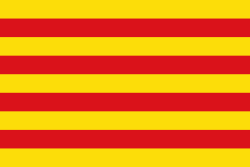Our website is made possible by displaying online advertisements to our visitors.
Please consider supporting us by disabling your ad blocker.
Catalan nationalism
| Catalan / Valencian cultural domain |
|---|
 |
Catalan nationalism promotes the idea that the Catalan people form a distinct nation and national identity. A related term is Catalanism (Catalan: catalanisme, Spanish: catalanismo), which is more related to regionalism and tends to have a wider meaning, most people who define themselves as Catalanist do not necessarily identify as Catalan nationalists.
Intellectually, modern Catalan nationalism can be said to have commenced as a political philosophy in the unsuccessful attempts to establish a federal state in Spain in the context of the First Republic (1873-1874). Valentí Almirall i Llozer and other intellectuals that participated in this process set up a new political ideology in the 19th century, to restore self-government, as well as to obtain recognition for the Catalan language. These demands were summarized in the so-called Bases de Manresa in 1892.
The movement had little support at first.[1] After the Spanish–American War, in which Spain lost the last of their colonies in the Pacific and the Caribbean, these early stages of Catalanism grew in support, mostly because of the weakened Spanish international position after the war and the loss of the two main destinations for Catalan exports (Cuba and Puerto Rico).
- ^ Fernández, Jesús Laínz (20 May 2010). Adiós, España. Ediciones Encuentro, S.A. ISBN 9788474907483. Retrieved 20 March 2015.
Previous Page Next Page


